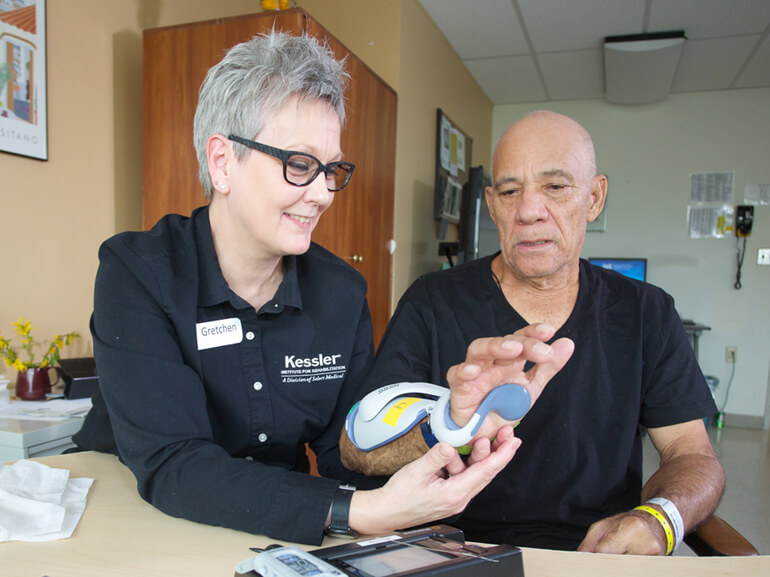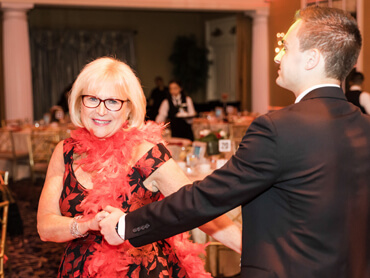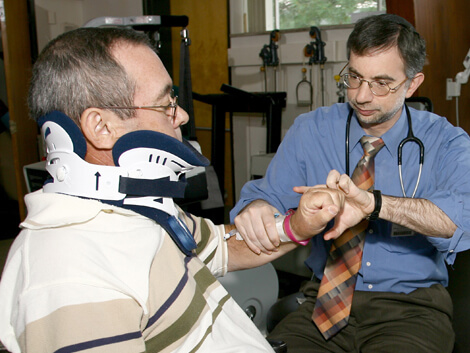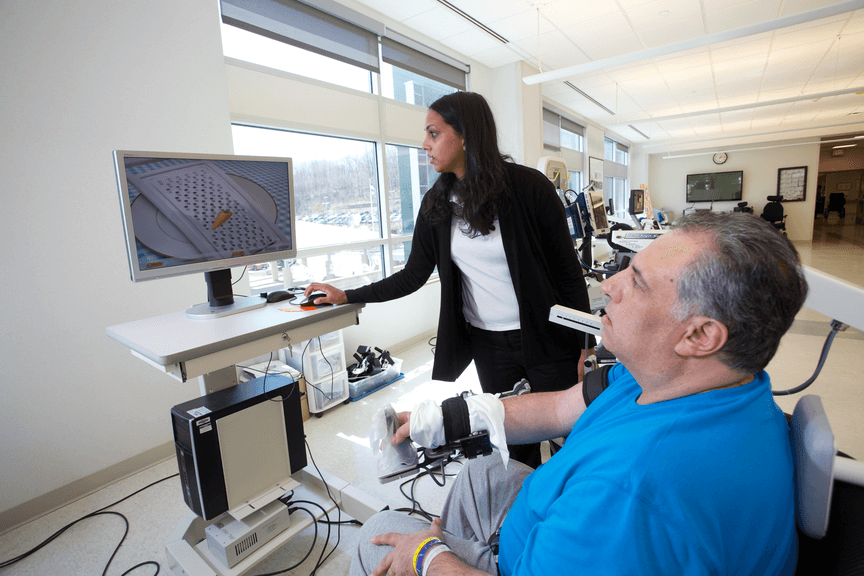Stroke Rehabilitation

The Kessler Difference
As one of the largest stroke rehabilitation programs in the country, Kessler Institute treats patients with a wide range of complex medical, physical, cognitive and emotional needs. This gives us the unparalleled expertise and experience to address your individual challenges, goals and hopes for the future.
-
Stroke survivors who choose an inpatient rehabilitation hospital like Kessler Institute have greater improvement, fewer complications and are able to return home sooner than those treated at nursing facilities or other settings.1,2,3 At Kessler Institute, you’ll find a highly individualized, carefully integrated program of stroke care that has been shown to make the difference in patients’ outcomes.
1Guidelines for Adult Stroke Rehabilitation and Recovery. American Heart Association, Inc. 2016.
2Comparison of Functional Status Improvements Among Patients with Stroke Receiving Postacute Care in Inpatient Rehabilitation vs. Skilled Nursing Facilities. JAMA. 2019.
3Assessment of Patient Outcomes of Rehabilitative Care Provided in Inpatient Rehabilitation Facilities (IRFs) and After Discharge.
-
According to the American Heart/American Stroke Association, “Stroke rehabilitation requires the sustained and coordinated effort of a large inter-professional team. Communication and coordination among team members is paramount in maximizing the effectiveness and efficiency of rehabilitation.” 1
At Kessler Institute, we draw on the knowledge of an experienced team of stroke rehabilitation specialists to address the range of medical, physical, functional and emotional issues you face.
This interdisciplinary team is led by a physiatrist, a physician board-certified in physical medicine and rehabilitation, and includes rehabilitation nurses; physical, occupational, speech, respiratory and recreation therapists; psychologists and neuropsychologists; dietitians; case managers and other clinical and support staff as needed.
1Guidelines for Adult Stroke Rehabilitation and Recovery. American Heart Association, Inc. 2016.
-
Studies show that the sooner you begin a highly coordinated, comprehensive stroke rehabilitation program, the greater gains you are likely to achieve.1 As a specialized hospital, Kessler offers you the earliest possible start to rehabilitation.We work closely with you, your family and the referring hospital to ensure a smooth transition to our program.
Here you will benefit from a minimum of three hours of physical, occupational and/or speech and other therapies a day, five days a week. The skills and strategies you learn will be reinforced by your nursing team and in recreational activities.
Depending the nature and extent of you stroke, you may be provided with a wheelchair and/or other assistive equipment, including electronic aids to assist with daily tasks.
You and your family will also be given the education and training to help you maintain your overall health and well-being following discharge.
When you’re ready, we’ll coordinate your discharge, help arrange for equipment and provide access to community resources that may be available to you. Our goal, like yours, is for you to move forward with as much independence and confidence as possible.
-
Treatment is carefully integrated and tailored to your specific needs and goals. Depending on the extent to which you have been impacted by your stroke, we will help you:
- Restore physical function and the ability to perform daily activities
- Gain strength and endurance
- Improve balance and mobility
- Overcome speech or communication deficits Address any swallowing issues or nutritional concerns
- Develop new cognitive, communication and behavioral strategies
- Improve any vision deficits
- Deal with any emotional, psychological and/or social challenges
- Return home to work, school or community activities with as much confidence and independence as possible
Kessler’s highly individualized program will also help to maximize recovery for patients whose needs may be complicated by other existing medical conditions and/or difficulties with alertness, sleep/wake cycles, confusion, debility or age-related factors.
-
On average, patients at Kessler Institute have greater improvement during their stay and greater functional abilities upon discharge, based on national benchmarks 4 that measure factors such as mobility and the ability to perform daily living activities. This generally translates to greater independence and a higher quality of life for those who choose us for their rehabilitation.
-
To help you return home and resume work, school, community and/or social activities, Kessler provides an unparalleled continuum and continuity of care. We are here to help you manage your health from inpatient to outpatient and offer lifelong follow-up. This includes medical, therapy, wheelchair and mobility needs, driving and other specialized services to meet any ongoing or changing needs.

Your progress. Our program
It’s important to remember that recovery takes time. Every patient is different and your stay with us will depend on the severity of your stroke, any other medical issues or personal factors and the progress you make each day. To help you reach your goals, Kessler offers specialized stroke services to meet your needs.
-
For more than 75 years, Kessler Institute has pioneered the field of medical rehabilitation. Today, we continue to provide you with advanced care and innovative treatment. That includes a combination of hands-on therapies and proven technologies to help you regain your strength, restore your skills and mobility and rebuild your life.
-
Some stroke survivors may need to use a wheelchair and it’s important that you are fitted properly. Kessler’s physical and/or occupational therapists, who are also certified assistive technology professionals and/or seating and mobility specialists, will evaluate your physical and lifestyle needs and use pressure mapping and other tools to find the option best for you.
-
To help reinforce your skills and restore your spirit, Kessler’s specially trained canine companions for independence* may be part of your therapy program. A number of our therapists work with these remarkable dogs to engage patients in a wide range of activities that support the rehabilitation process.
-
A stroke may interfere with the way a person thinks, behaves and functions. You may have difficulties with memory, concentration, communication, speech, swallowing and/or vision. You may also have problems walking or being able to perform basic tasks. Cognitive rehabilitation will provide you with the skills and strategies to overcome these challenges.
-
The ability to drive allows stroke survivors to resume a more independent lifestyle. Kessler Institute’s certified driver rehabilitation specialists offer evaluation and training to help appropriate individuals drive safely. They will also discuss modifications and/or adaptations that may needed for your car or van and provide guidance on updating your license and taking the required road test.
-
Preparing you and your family for life ahead is one of our primary goals. We provide extensive education to help you understand the challenges and opportunities of living with a stroke and the strategies, resources and training to help. We also offer a number of patient and family support groups where you’ll be able to discuss common concerns, share information and gain greater insight and encouragement.
-
The ability to perform daily activities at home, work, school or in the community is critical to your independence. Your therapy team may introduce a variety of electronic aids and other assistive technologies, such as advanced environmental controls, voice-activated systems, wireless headsets and other adaptive equipment that can help you manage these everyday tasks.
-
Kessler’s board certified orthotists are available onsite to provide patients with braces and other devices to support and improve the ability to walk or use your affected arm and hand. As prescribed or recommended by the treatment team, these devices are carefully fitted and you will be trained on their use and maintenance.

The technology of stroke recovery

To support your recovery, Kessler Institute brings innovation and leading-edge technologies to treatment - and continues to research the most promising new avenues of care.
Below are some of the many advances now available to appropriate patients:
- Robotic therapies, including exoskeletons, the Armeo Spring Trainer®, and ReoGO®, to optimize motor recovery
- Body-weight supported treadmill training and electrical stimulation devices to improve balance, gait and walking
- Constraint induced therapy, a specialized approach to increase the use of the affected limb; electrical stimulation; mirror therapy and other strategies to improve arm and hand function
- Electrical stimulation to reduce muscle atrophy
- Prism adaptation therapy that involves the use of special goggles and the Bioness Integrated Therapy System® (BITS), a computer-based program to address vision difficulties
- Devices, like Lingraphica®, to augment or improve speech and communication
- Videofluoroscopy, a special type of x-ray, and VitalStim® a non-invasive external electrical stimulation therapy to diagnose and treat swallowing disorders
- Computer-based exercises to improve cognition (memory, concentration, decision-making and other skills)
- Medications to manage spasticity
- Equipment, including voice-activated devices, that allows individuals to turn on lights, a television, etc. with greater ease and independence.
- Adaptive gaming and other platforms to help individuals participated in recreational and social activities.